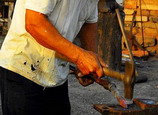
BEIJING, May 10 (Xinhua) -- Wang Mengqiang's worries always have something to do with his pigs. Falling hog prices after the dumping of dead pigs into Shanghai's Huangpu River has hit his business hard.
"I raised 120 pigs. The feed for them each day cost me 1,000 yuan (161.3 U.S. dollars), but they didn't sell well, and the pork price has dropped a lot," said Wang, a pig breeder from China's southwest city of Chengdu.
Hundreds of miles away in China's central city of Wuhan, poultry breeder Peng Jinming is anxious and frustrated at lost business caused by the outbreak of H7N9 influenza.
"I used to have an insatiable desire for more eggs from my hens. But now what I hate most is they are so productive," said Peng.
The stories of Wang and Peng illustrate the rough times of the country's livestock and poultry breeding industry, locked in comprehensive losses due to drastic declines in both prices and consumption.
In fear of the spread of H7N9, the Chinese government ordered the culling of poultry in some areas. It also closed live poultry markets to reduce contact with the birds, shattering demand all the way down the industry chain.
The China Animal Agriculture Association estimated that since the H7N9 influenza outbreak the poultry sector has recorded losses of more than 10 billion yuan, affecting more than 44 million breeders and companies.
"This is only the beginning. Compared with the bird-flu outbreak in 2009, the situation this time will remain for a longer period given the uncertainty of the source and infection routes of H7N9 virus," said Liu Yonghao, chairman of New Hope Group, China's leading agribusiness operator.
The swine breeding industry also experienced a downturn.
Official figures indicated that the hog-to-corn price ratio, a major indicator of the industry's profitability, has stayed under 6:1, the break-even point for farmers, for six straight weeks. Breeders lost more than 200 yuan for each pig they raised.
To ease the heavy burden on breeders, the Chinese government has joined hands with companies in the livestock and poultry industry to offer help.
It was proposed at an executive meeting of the State Council headed by Premier Li Keqiang that central finances will provide short-term subsidies in the form of loans to key poultry processing enterprises, so as to mitigate damage caused by the virus.
Since April, the Twins Group, a major company in China's feed industry, has surrendered part of the profits to make breeders' lives easier. By lowering the feed price, the group has contributed a total of 100 million yuan to help the loss rate of each pig drop 10 percent.
In addition, the debut of the hog futures market was also suggested by industry observers to prevent the fluctuation of prices.
"The launch of hog futures may help to lock in the price of the product, and protect hog breeders and processors from drastic price swings," said Bao Hongxing, chairman of the Twins Group.
















 Male nurse overcomes stereotypes
Male nurse overcomes stereotypes


![]()
